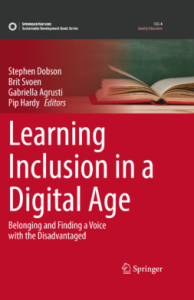 |
Learning Inclusion in a Digital Age: Belonging and Finding a Voice with the Disadvantaged showcases innovative ways on how to teach and learn inclusion, presents policy, institutional, professional and individual initiatives on inclusive learning. The LIDA project uses digital storytelling to give voice to and empower disadvantaged groups and minorities.
This book contains several chapters by Pip Hardy and Tony Sumner and considers how inclusive learning, wellbeing and active citizenship can be supported in a digital world.
This book is available as a free download from the Springer website. |
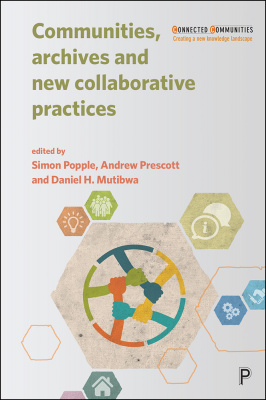 |
This innovative book examines the changing relationship between communities, citizens and the notion of the archive.
Archives have traditionally been understood as repositories of knowledge and experience, remote from the ordinary people who fund and populate them, however digital resources have led to a growing plurality of archives and the practices associated with collecting and curating. This book uses a broad range of case studies which place communities at the heart of this exciting development, to illustrate how their experiences are central to our understanding of this new terrain which challenges traditional histories and the control of knowledge and power.
Chapter 13: Silver hair, silver tongues, silver screen: recollection, reflection and representation through digital storytelling with older people by Tricia Jenkins and Pip Hardy, discuses the use of digital storytelling with older people. It looks at the the benefits of participation in the digital storytelling process before considering how these self-representations break down the traditional power structures represented by the notion of ‘archive’. |
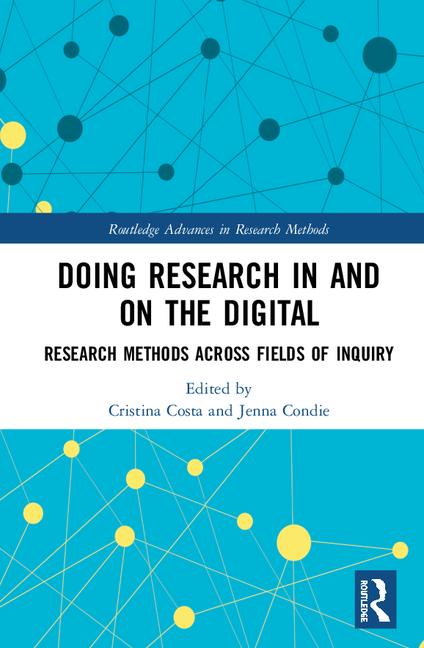 |
Doing Research In and On the Digital aims to deliver on two fronts: first, by detailing how researchers are devising and applying innovative research methods for and within the digital sphere, and, secondly, by discussing the ethical challenges and issues implied and encountered in such approaches.
Chapter 12: Using digital stories in healthcare research: ethical and practical dilemmas by Professor Carol Haigh, Manchester Metropolitan University and Dr Pip Hardy, Patient Voices explores the experiences of using digital stories to inform research data collection in the context of healthcare and healthcare education. It explores issues around veracity and reliability, the concept of power and consent, and examines how these ethical issues have an added dimension within the digital storytelling format. |
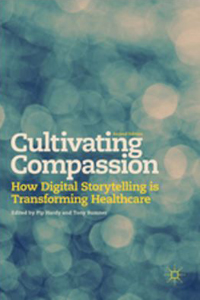 |
Edited by Pip Hardy and Tony Sumner, this book explores how digital storytelling can catalyze change in healthcare. The chapter authors discuss various applications for this technique; from using digital storytelling as a reflective process, to the use of digital stories in augmenting quantitative data.
Through six main sections this second edition covers areas including healthcare education, patient engagement, quality improvement and the use of digital storytelling research. The chapters illuminate how digital storytelling can lead to greater humanity, understanding and, ultimately, compassion. This collection will appeal to those involved in delivering, managing or receiving healthcare and healthcare education and research, as well as people interested in digital storytelling and participatory media. |
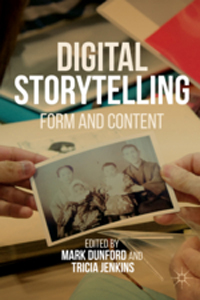 |
This edited collection brings together academics and practitioners to explore the uses of Digital Storytelling, which places the greatest possible emphasis on the voice of the storyteller. Case studies are used as a platform to investigate questions of concept, theory and practice, and to shine an interrogative light on this emergent form of participatory media. The collection examines the creative and academic roots of Digital Storytelling before drawing on a range of international examples to consider the way in which the practice has established itself and evolved in different settings across the world. |
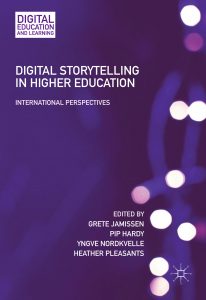 |
Edited by Grete Jamissen, Pip Hardy, Yngve Nordkvelle and Heather Pleasants, this book broadens the scope and impact of digital storytelling in higher education. It outlines how to teach, research and build communities in tertiary institutions through the particular form of audio-visual communication known as digital storytelling by developing relationships across professions, workplaces and civil society. The book is framed within the context of ‘The Four Scholarships’ developed by the Carnegie Foundation for the advancement and redefining of teaching, including the scholarships of discovery, integration, application, and teaching and learning.
Across four sections, this volume considers the potential of digital storytelling to improve, enhance and expand teaching, learning, research, and interactions with society. Written by an international range of academics, researchers and practitioners, from disciplines spanning medicine, anthropology, education, social work, film and media studies, rhetoric and the humanities, the book demonstrates the variety of ways in which digital storytelling offers solutions to key challenges within higher education for students, academics and citizens. It will be compelling reading for students and researchers working in education and sociology. |
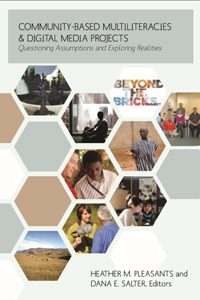 |
Within community-based digital literacies work, a fundamental question remains unanswered: Where are the stories and reflections of the researchers, scholars, and community workers themselves? We have learned much about contexts, discourses, and the multimodal nature of meaning making in literacy and digital media experiences. However, we have learned very little about those who initiate, facilitate, and direct these community-based multiliteracies and digital media projects. In Community-Based Multiliteracies & Digital Media Projects: Questioning Assumptions and Exploring Realities, contributors discuss exemplary work in the field of community-based digital literacies, while providing an insightful and critical perspective on how we begin to write ourselves into the stories of our work. In doing so, the book makes a powerful contribution to digital literacies praxis and pedagogy—within and outside of community-based contexts. |
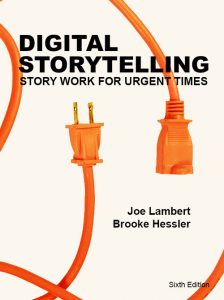 |
In this revised and updated edition of the StoryCenter’s popular guide to digital storytelling, co-founder Joe Lambert details the history and methods of digital storytelling practices. Using a “7 Steps” approach, Lambert helps storytellers identify the fundamentals of dynamic digital storytelling–from seeing the story, assembling it, and sharing it. As in the last edition, readers of the sixth edition will also find new explorations of the applications of digital storytelling and updated appendices that provide resources for budding digital storytellers, including information about past and present StoryCenter-affiliated projects and place-based storytelling, a narrative-based approach to understanding experience and landscape. Chapter 16 is Humanizing Healthcare: A Conversation with Pip Hardy & Tony Sumner |








